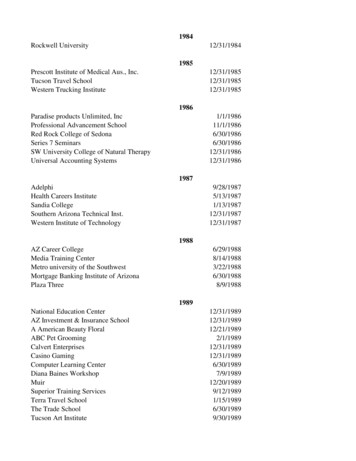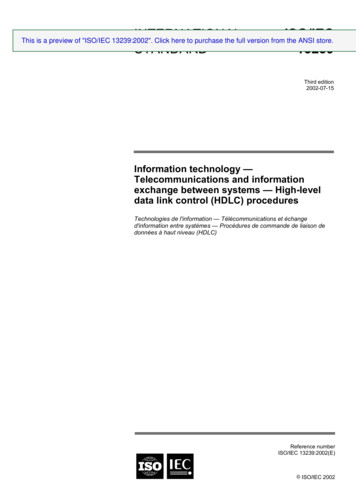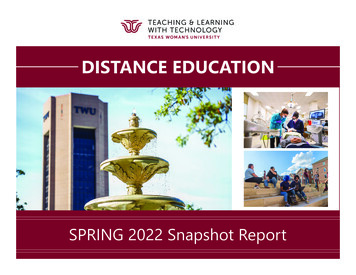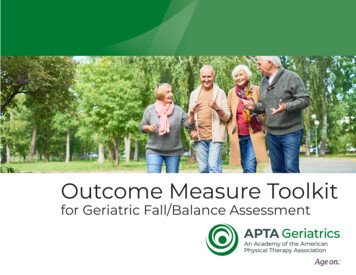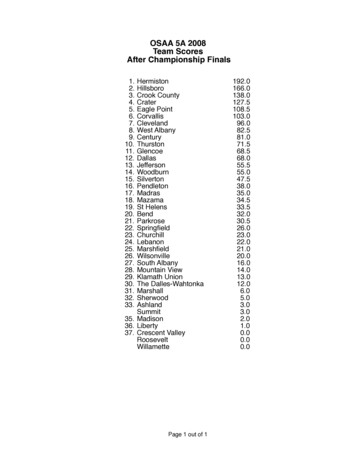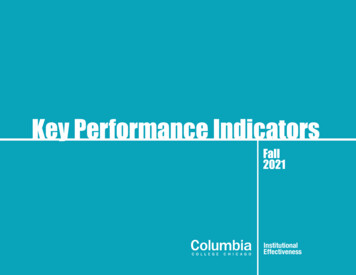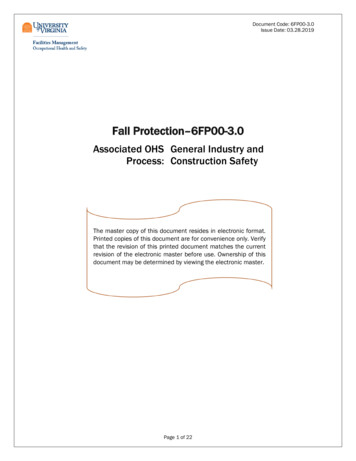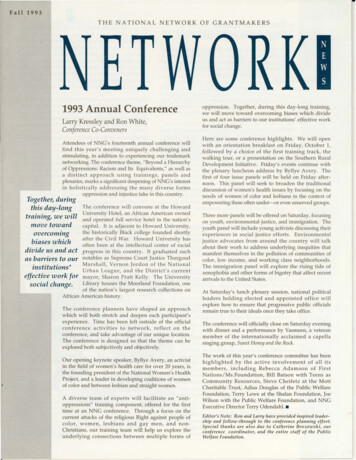
Transcription
Fall 1993THE NATIONAL NETWORK OF GRANTMAKERS1993 Annual ConferenceLarry Kressley and Ron White,Conference Co-ConvenersAttendees of NNe's fourteenth annual conference willfind this year's meeting uniquely challenging andstimulating, in addition to experiencing our trademarknetworking. The conference theme, "Beyond a Hierarchyof Oppressions: Racism and Its Equivalents," as well asa distinct approach using trainings, panels andplenaries, marks a Significant deepening of NNe's interestin holistically addressing the many diverse formsoppression and injustice take in this country.Together, duringthis day-longtraining, we willmove towardovercomingbiases whichdivide us and actas barriers to ourinstitutions'effective work forsocial change.The conference will convene at the HowardUniversity Hotel, an African American ownedand operated full service hotel in the nation'scapital. It is adjacent to Howard University,the historically Black college founded shortlyafter the Civil War. Howard University hasoften been at the intellectual center of racialprogress in this country. It graduated suchnotables as Supreme Court Justice ThurgoodMarshall, Vernon Jordon of the NationalUrban League, and the District's currentmayor, Sharon Pratt Kelly. The UniversityLibrary houses the Moorland Foundation, oneof the nation's largest research collections onAfrican American history.The conference planners have shaped an approachwhich will both stretch and deepen each participant'sexperience. Time has been left outside of the officialconference activities to network, reflect on theconference, and take advantage of our unique location.The conference is designed so that the theme can beexplored both subjectively and objectively.Our opening keynote speaker, Byllye Avery, an activistin the field of women's health care for over 20 years, isthe founding president of the National Women's HealthProject, and a leader in developing coalitions of womenof color and between lesbian and straight women.A diverse team of experts will facilitate an "antioppressions" training component, offered for the firsttime at an NNG conference. Through a focus on thecurrent attacks of the religious Right against people ofcolor, women, lesbians and gay men, and nonChristians, our training team will help us explore theunderlying connections between multiple forms ofoppression. Together, during this day-long training,we will move toward overcoming biases which divideus and act as barriers to our institutions' effective workfor social change.Here are some conference highlights. We will openwith an orientation breakfast on Friday, October 1,followed by a choice of the first training track, thewalking tour, or a presentation on the Southern RuralDevelopment Initiative. Friday's events continue withthe plenary luncheon address by Byllye Avery. Thefirst of four issue panels will be held on Friday afternoon. This panel will seek to broaden the traditionaldiscussion of women's health issues by focusing on theneeds of women of color and lesbians in the context ofempowering these often under---or even unserved groups.Three more panels will be offered on Saturday, focusingon youth, environmental justice, and immigration. Theyouth panel will include young activists discussing theirexperiences in social justice efforts. Environmentaljustice advocates from around the country will talkabout their work to address underlying inequities thatmanifest themselves in the pollution of communities ofcolor, low income, and working class neighborhoods.The immigration panel will explore the rising tide ofxenophobia and other forms of bigotry that affect recentarrivals to the United States.At Saturday's lunch plenary session, national politicalleaders holding elected and appointed office willexplore how to ensure that progressive public officialsremain true to their ideals once they take office.The conference will officially close on Saturday eveningwith dinner and a performance by Yasmeen, a veteranmember of the internationally acclaimed a capellasinging group, Sweet Honey and the Rock.The work of this year's conference committee has beenhighlighted by the active involvement of all itsmembers, including Rebecca Adamson of FirstNations/Ms.Foundation, Bill Batson with Teens asCommunity Resources, Steve Cheifetz at the MottCharitable Trust, Adisa Douglas of the Public WelfareFoundation, Terry Lowe at the Shalan Foundation, JoeWilson with the Public Welfare Foundation, and NNGExecutive Director Terry Odendahl.Editor's Note: Ron and Larry have provided inspired leadership and follow-through to the conference planning effort.Special thanks are also due to Catherine Brozowski, ourconference coordinator, and the entire staff of the PublicWelfare Foundation.
Southern RuralDevelopment InitiativeThe South is home to 34 percent of America's peopleand 46 percent of its poverty. The wealth produced bythe region's natural resources and labor has largely leftthe South. Of the 241 poorest counties in the UnitedStates, 223 are in the South."When this largea range ofinstitutions getstogether andidentifiespriorities fora region, fundershave to listen.There is something compellingabout such arepresentativeintermediary."How can the rural South get its fair share ofeconomic development? A new collaboration of24 regional organizations is tackling the hugechallenge of locating public and private capitaland redirecting it to rural areas in Southeastern states.An idea that evolved from Funders who Fundin the South, an NNG affinity group, gatheredsteam nine months ago as the Southern RuralDevelopment Initiative (SRDI). SRDI is committedto creating development capacity in rural areasthroughout the South.Member organizations fall into three groups:economic development financial organizations,Elizabeth Campbell, land-based training and development centers,Ford Foundationand community-based grantmaking programs.All of these groups have the common denominator of leveraging dollars and capital through theirrole as regional intermediaries.SRDI's sectors have designed ambitious programs thatare complementary to its public policy work but muchbroader in scope. The economic development sectorplans for a regional multi-bank consortium to financerural projects, a program to develop new uses forCDBG, Small Town grants, and coordination of thecapitalization of the region's community developmentfinancial institutions.The community-based funders sector's first priority isto attract funds to stabilize existing funding organizations and to start new ones in parts of the South wherenone exist. Such an infusion of development capitalwill allow the groups to substantially increase theirgrantmaking and technical assistance to grassrootsgroups. They also will collectively solicit funds forregranting to rural grassroots organizations withproven abilities but who have unfulfilled potentialbecause of lack of funding.SRDI members have come together three times: first todecide whether or not such a group should exist,secondly, to decide how to organize, and most recently,in a meeting at Highlander Research and EducationCenter in Newmarket, Tennessee, to decide on andprioritize plans of action.The land-based institutions sector has created aprogram to develop each center into a fully operationalrural development education and training center. Theywill coordinate SRDI's work to build the "humancapital" needed for successful development. This sectorwill also create a number of demonstration projects topioneer new directions for community-based ruralIn these three meetings, SRDI shaped its vision to builda collaborative effort anchored by communitybased organizations with philanthropy,business and government acting as strongpartners. The vision is long-term and at a scaleto have significant impact on the region's mostdistressed rural areas. Its primary goal is tomove substantial capital efficiently to grassroots development organizations.Continued on page 7The SRDI model has found receptive audiencesinside the Clinton administration and somemajor foundations. In December, the membersseized a rare opportunity provided by thetransition to a new federal administration.SRDI drafted a public policy paper, "RuralDevelopment Reconsidered: A Perspectivefrom the South." The paper was distributed tothe President and all cabinet secretariesthrough the Executive Branch Agencies officeof the transition.The paper was followed by a series of meetingsat the White House, USDA, the Department ofCommerce, HUD and members of Congress.In each case, SRDI organizers have experienced2a warm welcome. The SRDI model incorporates manyof the themes the White House is promoting tofederal departments: interdepartmental cooperation,partnerships with non-profits and the private sector,and coordination of programs targeted to particularproblems. Also, the new administration is determinedto reverse the neglect of rural America and to buildrural programs that go beyond agriculture to a broadervision of rural development. SRDI has drafted for theadministration's consideration an interdepartmentalinitiative for the nation's most distressed rural areas.
Committee ReportNew Evaluation Guide at the Heart ofPhilanthropic ReformAfter nearly a year of hard work on the part of thePhilanthropic Reform Committee, co-chaired by EllenFurnari and Carol Mollner, a new publication, theEvaluation Guide: What is Good Grantmaking forSocial Iustice?, was released in April. The Guide wasproduced with the help of advisers throughout thenonprofit community. It has been so popular that fourmonths later, we are nearly out of the first 1000 copies,and about to reprint. We are still seeking funds for thisproject. Grants from the Ben & Jerry's Foundation andthe Needmor Foundation paid for the first printing.The Evaluation Guide was distributed free to all NNGmembers, to other leaders in the grantmaking field, andat a Philanthropic Reform Workshop sponsored byNNG at the Council on Foundations meetings. It isavailable for sale at 15.00 a copy, or 5.00 each for bulkorders of five or more.The Committee's goal is to have everyone in the Networkuse the Guide in their funding program or organization.Let us know about your experiences with the Guide.The Evaluation Guide is an evolving document. We will berevising it next year. The 1994 edition will be accompaniedby a How-To Guide, which gives concrete examples ofpromising strategies that funders and grantseekers haveused to promote accessibility, accountability, good relationswith donees, and social justice work more generally. Weneed your help in putting together the new Guide and itscompanion How-To Guide. We ask that you write or faxus with your ideas. Even better, we invite you to join thePhilanthropic Reform Committee.In addition to this ambitious publication program, theCommittee is planning a series of regional meetings betweengrantseekers and grantmakers. Smaller working groups areorganizing these gatherings, so far in Denver, New York, andprobably the Twin Cities. We hope to sponsor others in theSouth and on the west coast. We are looking for volunteers tojoin in the philanthropic reform effort. Could you host ameeting or participate? Contact Carol, Ellen (phone numbersare on the back) or the national office if you can help. IFrom the Co-ChairsBy Catherine Lerza, Shalan Foundationand Miyoko Oshima, Tides FoundationRecently the two of us had the welcome and rare opportunity to sit down face to face and talk. Of course, we talked aboutthe National Network of Grantmakers. We talked business: the six month review of our executive director; institutionalsupporters; the effectiveness of our once or twice monthly executive committee conference calls. We then began to discussthe ugly face of racism in this country. Miyoko talked about California where the Governer and even "liberal" (female)senators are jumping on the anti-immigrant bandwagon, proposing armed borders and the denial of citizenship toAmerican born children of undocumented people. Cathy, a recent arrival in Washington D.C., talked about the fact that formost people "inside the beltway," race, gender, sexual orientation etc. are treated as unpleasant, irritating and superficialissues that get in the way of what is "real" work-legislation, policy agendas, dealmaking.We both realize how grateful we are to NNG and how proud we are of this organization, now 16 or 17 years old (it dependson who you talk to) and its value to us personally and politically. NNG has been a "training ground" and "support network"for many grantmakers. Many members have also formed long-lasting friendships through NNG.NNG members talk-in depth-about issues and conflicts and difficulties that others prefer to ignore. We try, publicly, totackle the contradictions inherent in the term "progressive grantmaker." In this era, when concern about inclusiveness, processand language is dismissed as subservience to political correctness, our annual conference is addressing, head on, the "isms" thatfragment and erode America and the world. We use the word "oppression" without embarrassment, knowing andacknowledging that oppression, like racism, sexism, homophobia, and able-ism, is real and creates the conditions under whichmost people in the world live. We also realize that this system of domination has changed over the years and that we mustalso adapt our strategies accordingly. This is precisely the challenge that NNG faces in the "insider/outsider" role withinphilanthropy.We thank the leadership of NNG, our amazing executive director Terry Odendahl, our board of directors, especiallyconference co-chairs Larry Kressley and Ron White, and the dozens of NNG members who serve on committees and domuch of the organization's work, for being leaders in philanthropy and in the community at large. You have all demonstratedthat being "politically correct" means calling individuals and institutions on behavior and language; supporting projects thatbuild visionary programs; and speaking out for a world which celebrates diversity, is free of imperialism, oppression anddiscrimination based on race, ethnicity, class, gender, sexual orientation, religion, age, and ability. By struggling with theseissues inside our own institutions and our hearts, we will be proudly and we hope effectively politically correct, and moreimportantly, promoting progressive social change.3
Interview withTerry OdendahlCathy Lerza and Miyoko Oshima,NNG Co-ConvenersWhy did you want to be the Director of NNG?NNG has historically been the one group within philanthropy dedicated to progressive reform. NNG is a placewhere we can talk and think about creating a new future.Grantmakers are not terribly accessible to the peoplemost in need of funds.I feel fortunate to be with NNG now. In the field ofphilanthropy, NNG tries to act as a bridge betweengrantmakers and grantseekers. My values and viewson philanthropy are identical to those in NNe's mission statement. In addition, I am an advocate of turning grantmaking decisions over to representatives ofthe communities in greatest need, or most affected bywhere foundation funds are going.What were you doing just before taking the NNG position?In addition, my background and interests suit theposition. For the past 15 years, I have been in and outof the grantmaking world. In the late 1970s I workedfor the Business and Professional Women's Foundation.I started as a research assistant and three yearslater became acting Executive Director. Whilewriting my dissertation, I was aconsultant for Women andFoundations/CorporatePhilanthropy.That projectresulted in my first book,Working in Foundations: CareerPatterns of Women and Men(with E. Boris and A.K. Daniels,1985). After receiving my PhDin Cultural Anthropology, I wasrecruited to Yale University'sProgram on Non-Profit Organizations where I managed a studyon the "health" of the foundationfield. America's Wealthy and theFuture of Foundations (1987)came out of that research. Theinterviews we conducted withphilanthropists and my analysisof them eventually resulted in my most recent book,Charity Begins at Home: Generosity and Self-InterestAmong the Philanthropic Elite (1990).So, I started my career as a foundation employee, thenbecame more established as a researcher in the grantmaking field. I moved back to Colorado in 1987 as thefirst staff director of the Women's Foundation ofColorado. My experience there helped me to finishwriting the Charity book, and catapulted me into a newrole of "social critic."How did you become a social critic? What interestsyou in philanthropy?I remember being invited to make a presentation at aconference where the name tag they had prepared forme read "social critic." It was a label given to me after Iwrote the Charity book.Generally speaking, the world of. foundations andgrantmaking has almost no accountability. Many boardmembers, employees, and individual donors do notview their work as principally in the public interest.Because of the tax advantages of major giving, I believewe need to consider grantmaking a public endeavor. Ihave found through my past research that the vastmajority of private funding perpetuates the status quo.4I had been teaching Women's Studies at the Universityof California, San Diego, on a part-time basis, andconsulting with grassroots groups around the country.I had a child in 1989, which changed my life tremendouslyand in an extremely positive way. I also worked as theDirector of Development at METRO, a UnitedMethodist Church social service program. As a volunteer,I was co-founder and Board Chair of the Institute forWomen's Policy Research in Washington, D.C., andChair of the newly formed AIDS Foundation San Diego.What do you think are the challenging social issues thatneed to be addressed by the philanthropic community?Unfortunately, there are so many I hardly know whereto begin. The theme of the annual conference this year- "Beyond a Hierarchy of Oppressions" - encompassesa vision I hold of social and economic justice whereinprogressive groups and individuals work together insolidarity. As a feminist, I am quite concerned aboutcivil rights in the broadest sense, for all people, whateverour color, including environmental justice, immigrationissues, lesbian and gay liberation. Much of my activistwork has focused on women. Of late, I have beendeveloping a particular interest in "border" and international issues. The world is changing. Border areasare being barricaded, polluted, redefined. Hate crimesare becoming frighteningly more common everywhere.In this era of extreme social and economic injustice, we·need to promote the very unpopular idea of a moreequitable distribution of wealth. That's a start.With regard to the philanthropic community, privategrantmakers can be involved with all these issues andmore. But briefly, I think philanthropy should serve as acatalyst for new ideas, new ways of doing things,especially thinking about issues and funding acrosscategories. We can also be a "watchdog" of government.How has the move to San Diego been for NNG?It's been working well. It's been incredibly stimulatingfor me. We have recruited a few new members inSouthern California. But, San Diego is just where the officeis housed. NNG is all our members, across the country.As you know, in tIus day and age, an organization's officecan be located almost anywhere. Thanks to technology,especially the fax machine and phone (which I am on allthe time), communication is fast and good. I also doquite a bit of traveling to stay in touch with our projects,to meet with groups of grantmakers, and to re-affirm theimportance of NNG at sites across the nation.Continued on page 7
Recent Publications andReports of InterestSan Francisco, and Washington, D.C. to discuss theissues raised in the report. If you are interested in hosting a session, or in getting a copy of the report, pleasecall Carol Seifert (202) 332-3224. The Alliance for Justice's, Justice for Sale:Shortchanging the Public Interest for Private Gain,documents a sophisticated and well-funded campaign"that promotes a legal system where justice is boughtand sold just like any other commodity," laments NanAron, director of the Alliance, an association of publicinterest law firms. Asian American and Pacific Islanders in Philanthropy(AAPIP), "Invisible and in Need: Philanthropic Givingto Asian American and Pacific Islanders," argues thatthe common, but misguided perception that Asiansrepresent a "model" minority undermines and divertsattention from the persistent problems of poverty, hatecrimes, health care, labor conditions, and domesticviolence that continue to challenge Asian Americancommunities. Grantmakers gave less than one percentof their 1990 grants to programs for these populations.Several recommendations for grantmakers interestedin funding Asian American and Pacific Islander causesare offered. Free copies are available from AAPIP,P.O. Box 591389, San Francisco, CA 94159-1389;or call 415-772-4388.A powerful coalition of corporations and conservativefoundations are spending millions of tax-free dolIars toredefine the term justice. The study describes how during the 1970's and 1980's, corporations and foundationsbegan funding scholars, law schools, and institutionsthat applied economic principals to legal issues.Since 1988, the Olin Foundation has provided over 13 million for the development of law and economicsprograms at the nation's most elite law schools.The unified purpose of these funders has allowed themto recast legal discusssion in terms more sympathetic toenhancing corporate wealth, and to generate publicsympathy for economic efficiency at the expense ofindividual rights. The study also makes clear that thereasons these conservative funders succeeded is thatthey did not shy away from putting their money intoadvocacy efforts and lobbying campaigns.Justice for Sale will be part of a public educationcampaign effort to encourage foundation support forprogressive advocacy groups. NNG and the Allianceare planning meetings in Austin, Boston, Chicago, Emmett D. Carson, Diversity & Equity AmongFoundation Grantmakers, provides a summaryexamination of the racial and gender composition offoundation adminstrative and program staff. Carsonpresents survey results that suggest inequities insalaries and in proportional representation of certainracial minorities and women in various job categories,as well as in their stability within those positions inregard to turnover rates and the "glass ceiling." Carsonacknowledges improved recruitment within the field ofphilanthropy, but questions the minimal numbers ofHispanics and Native Americans at any level, as well asAsian Americans and Blacks in higher positions.For copies, contact ABFE, 1828 L Street, N. W., Ste 1200,Washington, D.C. 20036. Jeff Cohen and Norman Solomon, with cartoons byMatt Wuerker and Tom Tomorrow, and photos byJennifer War burg, Ad ventures inMedialand: Behind the News, Beyond thePundits, exerpted and summarized fromintroduction by Molly Ivins. The number ofcorporations controlling the major mediaoutlets in the U.S. has dropped from 50 in1982 to about 20 by 1993, and it is stilldropping. At the end of World War II, 80percent of the American newspapers wereindependently owned. Today most arecontrolled by 15 chains."The notion that on any given storyall you have to do is report what bothsides say and you've done a fine job '"debilitates the press. [In journalism,t]here is no such thing as objectivity, andthe truth, that slippery little bugger, hasthe oddest habit of being way to the helloff to one side or the other. [M]ost storiesaren't two-sided, they're 17-sided at least.[I]t's no help to either the readers or thetruth to quote one side saying "Cat," andthe other side saying "Dog," while truth isthere's an elephant crashing around outContinued on page 75
Changes in theNetwork: People and Jobs Susan Beaudry has become Executive Director of theAbelard Foundation and Common Counsel, in Berkeley,CA. We welcome her to NNe. Leah Brumer left the Abelard Foundation andCommon Council to pursue various personal projects,including writing. She continues to serve on the boardof the Jewish Fund for Justice. Seth Borgos is a relatively new Program Officer at theNorth Shore Unitarian Universalist Veatch Program.Welcome to the field. Paul Castro, the Chair of the United Latino Fund in ElMonte, CA recently joined NNG. Welcome to Paul andthe Fund. Gayle Dorman is the new Executive Director of theMary Reynolds Babcock Foundation in Winston-Salem,North Carolina. Jean Entine has moved to San Francisco, leaving herposition at the Boston Foundation. Marjorie Fine has joined the North Shore UnitarianUniversalist Veatch Program staff as Executive Director,leaving the North Star Fund in New York City. Ellen Friedman is returning to the Tides Foundation inOctober from maternity leave. Her baby's name is Lucy. Debra Furry is the new Executive Director of theNational Alliance for Choice in Giving in WashingtonD.C. Welcome to the Network. Joan Garner has been promoted to Executive Directorof the Fund for Southern Communities in Atlanta.Congratulations. Alexander Gray, Program Coordinator, Cee ScottBrown and Marianne Weems, board members, of ArtMatters, in New York, recently joined NNG. We arepleased to have them with us. Salvatore La Spada has joined Rockefeller FinancialServices in New York as a Philanthropic Advisor.Welcome to the Network. Florence Lastique was hired at the NormanFoundation as a Program Assistant. Welcome. Cathy Lerza has moved to Washington, D.C. to directthe Sustainable Communities Project and get married.She is a board member of the Shalan Foundation inSan Francisco, where she was Executive Directorfor many years. Former Associate Director, Terry Lowe, is the InterimDirector of the Shalan Foundation as it winds down itsoperations.6 Patricia Maher is the new Executive Director of theHaymarket People's Fund. Welcome. Jose Luis Morin is the new Executive Director of theNorth Star Fund in New York, where he had beenserving on the board.Tia Oros is the new Associate for ProgramDevelopment at the Seventh Generation Fund.Welcome. Kimberly Otis is Executive Director of the new SisterFund in New York. Welcome to NNe. Carol Pencke is the new Executive Director of ATerritory Resource.in Seattle. Welcome. Jeannie Ritter has joined the staff of the Jewish Fundfor Justice as a Program Officer. Peggy Saika, New World Foundation board member,is the new director of the Asian Pacific IslanderEnvironmental Network. Hubert Sapp is the new Executive Director ofOxfam America. Barbara Taveras is the relatively new ExecutiveDirector of the Edward Hazen Foundation in NewYork. Welcome to NNG.We apologize for any oversights in this list. Please callor send in such information for future newsletters.Delegation to EI SalvadorThe National Network of Grantmakers, in co-operation withthe SHARE Foundation, is organizing a delegation of itsmembers to serve as monitors of the March 1994 nationalelections in EI Salvador. This election is hoped to be the finalchapter in a twelve year long civil war and the first free andfair election in the country's history. Every elected officialin the country, including the President, members ofthe Legislative Assembly and all municipal offices, willbe chosen.The NNG delegation is expected to be in El Salvador forseveral days prior to the March 20 election, election dayitself, and the days immediately thereafter. Members of thedelegation will join with other monitors from around theworld at polling sites throughout the country to observe thevoting process and the vote count. Prior to election day,monitors will meet with representatives of the politicalparties in EI Salvador, the Supreme Electoral Tribunaland non-governmental organizations involved in voterregistration and voter education efforts.Specific plans for the delegation are currently beingdeveloped. If you are interested in participating in thishistoric effort, please contact:NNG Board member Larry Kressley at (202) 965-1800 orNNG Executive Director Terry Odendahl (619) 220-0690.
Southern Rural DevelopmentInitiative from page 2development. A special program to link rural economicdevelopment with cultural and historic preservation isalso among this sector's projects.Foundation staff and trustees who have participated asSRDI's "funder collaborators" have been impressed withthe collaborative's rapid development. At theHighlander meeting, the funders present concluded thatit is imperative that grantmakers support SRDI inaddition to, and not instead of, their current work inrural development.SRDI is currently in the process of incorporation andand application for tax exemption. In the meantime,NNG continues to serve as the proud parent of thisimpressive endeavor.Interview with Terry Odendahlfrom page 4Tell us a little about your personal life as it relates tothe job.My partner Michael Bernstein (who teaches history atUCSD) was enthusiastic and supportive about my takingthe job, and continues to be. I just step across the backyard to get to the office. It's a wonderful commute. But,there are drawbacks. After our 4 year-old, Eleanor, goesto bed at night, I am tempted to go back to the office towork, and often do. As with all of us, I am searching for abalance between my personal life and job.Did anything surprise you as Executive Director of NNG?It is good to realize how committed people are to theorganization. NNG members do many things for usoutside their formal jobs. Some of them are evenrethinking their careers in philanthropy, but they wantto continue working for NNG as volunteers. They clearlyunderstand the need for NNG. Many people also feelthat NNG is their first affiliation.So, the commitment and dedication of the members, andespecially the leadership, has been an inspiration to me.At the same time, the administrative aspects of the jobcan take up all my ti
THE NATIONAL NETWORK OF GRANTMAKERS Together, during this day-long training, wewill move toward overcoming biases which divide us and act as barriers to our institutions' effective workfor social change. 1993 Annual Conference Larry Kressley and Ron White, Conference Co-Conveners Attendees of NNe'sfourteenth annual conference will


